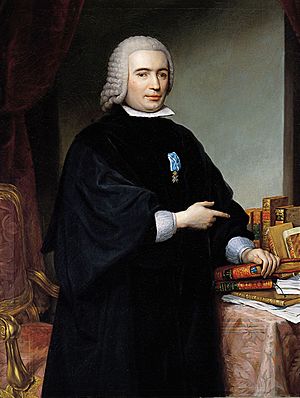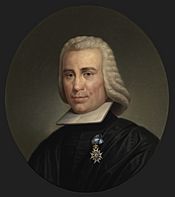Pedro Rodríguez, Count of Campomanes facts for kids
Quick facts for kids
The Most Excellent
The Count of Campomanes
|
|
|---|---|

Portrait by Francisco Bayeu, 1777
|
|
| Minister of the Treasury | |
| In office 1760–1762 |
|
| Monarch | Charles III |
| Seat E of the Real Academia Española | |
| In office 8 February 1763 – 3 February 1802 |
|
| Preceded by | Javier de Aguirre |
| Succeeded by | Antonio Ranz Romanillos |
| Personal details | |
| Born | 1 July 1723 Tineo, Spain |
| Died | 3 February 1802 (aged 78) Madrid, Spain |
Pedro Rodríguez de Campomanes y Pérez, 1st Count of Campomanes (born July 1, 1723 – died February 3, 1802), was a very important Spanish statesman, economist, and writer. He served as the Minister of the Treasury in 1760. Campomanes believed that the government should have more power than the Church. He was a key part of King Charles III's government. He strongly disliked the Jesuits and was a main reason why they were removed from Spain.
Contents
Early Life and Education
We don't know a lot about Pedro Rodríguez de Campomanes's early life. His family had a noble background (they were hidalgos), but they were not rich. When his father died, his mother asked an uncle to help raise him. This uncle was connected to the Colegiata de Santillana del Mar.
Even as a child, Campomanes showed how smart he was. He was very good at learning old languages like Latin and Greek. By the age of 10, he had already translated parts of a famous Roman poem by Ovid. He later studied law at the University of Oviedo and finished his studies in Seville. After that, he moved to Madrid to start his own law office.
Campomanes loved to learn new things. He was especially interested in history, economics, and how languages work. He studied many old and new languages, including Arabic.
Rise to Influence
In 1747, Campomanes wrote a book about the history of the Knights Templar. This book caught the attention of the Spanish royal family. It also helped lead to the removal of the Jesuits from Spain in 1767.
In 1750, he wrote an important text about Spain's economy. He used the pen name Rodrigo Perianes Campo for this work.

Economic Ideas and Reforms
Campomanes wrote several important books about how to make Spain's economy stronger. Two of his most famous essays were Discurso sobre el fomento de la industria popular (1774) and Discurso sobre la educación popular de los artesanos y su fomento (1775). In these books, he argued that Spain needed to bring back its old crafts and industries. He believed this would make the country richer.
He also wrote Tratado de la regalia de amortización. In this book, he looked at how kings had tried to limit the Church's ability to buy land. By the 17th century, Spain's economy was not growing, but the Church owned a lot of land. During the Bourbon Reforms, limiting the Church's land ownership was seen as a way to help the economy grow.
Campomanes's ideas about improving the Spanish economy were very influential. He studied why crafts and manufacturing had declined in Spain. He suggested ways to improve or restart old industries. His detailed work included many royal rules and laws about encouraging arts and manufacturing. He also talked about bringing in raw materials from other countries.
He looked at the role of artisan guilds, which were groups of skilled workers. He criticized their special rules that made it hard for new artisans to join. He thought it was a good idea to bring skilled foreign workers to Spain. He even suggested that women should work. He clearly stated that a country's industrial progress was the best way to measure its success.
The plant genus Campomanesia, which belongs to the Myrtaceae family, is named after him.
Later Life
In 1784, Pedro Rodríguez de Campomanes became a member of the American Philosophical Society in Philadelphia. From 1788 to 1793, he was the president of the Council of Castile. This was a very powerful position in the Spanish government.
However, when Charles IV became king, Campomanes was removed from his job. He then retired from public life.
Count Campomanes passed away on February 3, 1802.
See also
 In Spanish: Pedro Rodríguez de Campomanes para niños
In Spanish: Pedro Rodríguez de Campomanes para niños
Images for kids
 | Aaron Henry |
 | T. R. M. Howard |
 | Jesse Jackson |


